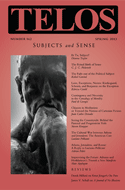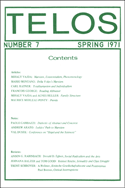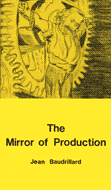By Roger K. Green · Thursday, April 11, 2013 The following paper was presented at the Seventh Annual Telos Conference, held on February 15–17, 2013, in New York City.
 In Faith of The Faithless: Experiments in Political Theology, Simon Critchley writes: “What is lacking is a theory and practice of the general will understood as the supreme fiction of final belief that would take place in the act by which a people becomes a people or by which a free association is formed” (92). Critchley’s work turns to poetics or “making” as a mode of engagement and resistance for dealing with democratic-liberal crises. I suggest that psychedelic aesthetics and religion can provide a discursive ground for Critchley’s “supreme fiction” in the United States, because the making of the sacrificial figure in the psychedelic experience presents itself as capable of more ethically aware citizenship. A brief historical look at religions founded in the 1960s gives insight into the instantiation of a certain citizenship. In Faith of The Faithless: Experiments in Political Theology, Simon Critchley writes: “What is lacking is a theory and practice of the general will understood as the supreme fiction of final belief that would take place in the act by which a people becomes a people or by which a free association is formed” (92). Critchley’s work turns to poetics or “making” as a mode of engagement and resistance for dealing with democratic-liberal crises. I suggest that psychedelic aesthetics and religion can provide a discursive ground for Critchley’s “supreme fiction” in the United States, because the making of the sacrificial figure in the psychedelic experience presents itself as capable of more ethically aware citizenship. A brief historical look at religions founded in the 1960s gives insight into the instantiation of a certain citizenship.
Continue reading →
By Rebecca Gould · Wednesday, April 10, 2013 Rebecca Gould’s “Laws, Exceptions, Norms: Kierkegaard, Schmitt, and Benjamin on the Exception” appears in Telos 162 (Spring 2013). Read the full version online at the Telos Online website, or purchase a print copy of the issue in our store.
 The concept of the exception has heavily shaped modern political theory. In modernity, Kierkegaard was one of the first philosophers to propound the exception as a facilitator of metaphysical transcendence. Merging Kierkegaard’s metaphysical exception with early modern political theorist Jean Bodin’s theory of sovereignty, Carl Schmitt introduced sovereignty to metaphysics. He thereby made an early modern concept usable in a post-metaphysical world. This essay carries Schmitt’s appropriation one step further. Drawing on Walter Benjamin’s replacement of transcendental metaphysics with contingent creaturehood, it reintroduces the anti-foundationalist concept of repetition that was implicit in Kierkegaard’s paradigm but which was not made lucid until Benjamin crafted from the Schmittian exception a vision of political life grounded in creaturely existence. The concept of the exception has heavily shaped modern political theory. In modernity, Kierkegaard was one of the first philosophers to propound the exception as a facilitator of metaphysical transcendence. Merging Kierkegaard’s metaphysical exception with early modern political theorist Jean Bodin’s theory of sovereignty, Carl Schmitt introduced sovereignty to metaphysics. He thereby made an early modern concept usable in a post-metaphysical world. This essay carries Schmitt’s appropriation one step further. Drawing on Walter Benjamin’s replacement of transcendental metaphysics with contingent creaturehood, it reintroduces the anti-foundationalist concept of repetition that was implicit in Kierkegaard’s paradigm but which was not made lucid until Benjamin crafted from the Schmittian exception a vision of political life grounded in creaturely existence.
Continue reading →
By James Santucci · Tuesday, April 9, 2013 As an occasional feature on TELOSscope, we highlight a past Telos article whose critical insights continue to illuminate our thinking and challenge our assumptions. Today, James Santucci looks at François George’s “Reading Althusser,” from Telos 7 (Spring 1971).
François George believes that Louis Althusser does not deserve his reputation, and he wants to prove it to you. He writes:
 Since the mainstay of [Althusser’s] thought is its “rigor,” we will demonstrate that it is the least rigorous of all, taking as the principal example his recent work, Lenine et la Philosophic. The occasion for the following discussion is a conference in an extremely academic context: the French Society of Philosophy. Naturally, Althusser feels uneasy in this situation. Marxists, for whom thought should be practical, must seek to transform society rather than to exert themselves in these closed contexts. Was he forced to attend? Althusser accepts his role only by dismissing it. . . . Why has he come, if he rejects this degraded form of philosophy and human relations? He is interested only in the justification of this rejection or, in his own words, this denial: “the only possible communications and discussions are scientific ones.” Under the pretext of attacking the meaninglessness of the philosophical gatherings in which he participates, Althusser rejects all non-scientific human communications as a scientist addressing a “scientific society.” Evidently, then, Althusser attends the French Society of Philosophy conference because he lacks the qualifications required by the international congress on astrophysics. All would go well, said Proudhon, when the government’s power was replaced by that of the Academy of Sciences—which should not be confused with the workers’ councils. (73–74) Since the mainstay of [Althusser’s] thought is its “rigor,” we will demonstrate that it is the least rigorous of all, taking as the principal example his recent work, Lenine et la Philosophic. The occasion for the following discussion is a conference in an extremely academic context: the French Society of Philosophy. Naturally, Althusser feels uneasy in this situation. Marxists, for whom thought should be practical, must seek to transform society rather than to exert themselves in these closed contexts. Was he forced to attend? Althusser accepts his role only by dismissing it. . . . Why has he come, if he rejects this degraded form of philosophy and human relations? He is interested only in the justification of this rejection or, in his own words, this denial: “the only possible communications and discussions are scientific ones.” Under the pretext of attacking the meaninglessness of the philosophical gatherings in which he participates, Althusser rejects all non-scientific human communications as a scientist addressing a “scientific society.” Evidently, then, Althusser attends the French Society of Philosophy conference because he lacks the qualifications required by the international congress on astrophysics. All would go well, said Proudhon, when the government’s power was replaced by that of the Academy of Sciences—which should not be confused with the workers’ councils. (73–74)
Continue reading →
By Jeffrey W. Robbins · Friday, April 5, 2013 The following paper was presented at the Seventh Annual Telos Conference, held on February 15–17, 2013, in New York City.
 With the confirmation hearings of John Brennan as director of the CIA fresh in the news, who can doubt the accuracy, or at least the resonance, of Carl Schmitt’s conception of the sovereign—the sovereign is “he who decides on the exception.” With sovereignty so conceived, it has effectively been cast outside the law, introducing a certain arbitrariness and creating a legal limbo that undermine the principles of a liberal democracy. With the confirmation hearings of John Brennan as director of the CIA fresh in the news, who can doubt the accuracy, or at least the resonance, of Carl Schmitt’s conception of the sovereign—the sovereign is “he who decides on the exception.” With sovereignty so conceived, it has effectively been cast outside the law, introducing a certain arbitrariness and creating a legal limbo that undermine the principles of a liberal democracy.
Enhanced interrogation. Drone attacks on foreign soil. Targeted assassinations. And now, a 16-page white paper from the Department of Justice outlining the legal authority to kill a U.S. citizen without trial. In the words of the New York Times report, the legal brief “adopts an elastic definition of an ‘imminent’ threat, saying it is not necessary for a specific attack to be in process when a target is found.” It also asserts that the decision to kill is not subject to judicial review or restraint.
Continue reading →
By Luciano Pellicani · Thursday, April 4, 2013 Luciano Pellicani ‘s “The Cultural War between Athens and Jerusalem: The American Case” appears in Telos 162 (Spring 2013). Read the full version online at the Telos Online website, or purchase a print copy of the issue in our store.
 Despite what Harold Berman claimed, the writers of the American Constitution were not inspired by strong religious convictions. On the contrary, as typical men of the Enlightenment they were severe critics of Christianity, considering it an obscurantist and intolerant tradition in all its versions. Hence their cultural battle to achieve the institutionalization of what Thomas Jefferson called “the wall of separation between State and Church” that would guarantee the greatest religious freedom. A freedom that was periodically threatened by fundamentalist movements which, in the name of Jerusalem, sought—and still seek—to establish a confessional state governed by the truth revealed in the Bible whereas the founding fathers hoped that “what Athens was in miniature, America will be in magnitude.” It is not true that America was born modern and progressive, as Ernest Gellner has maintained. It became so through the cultural war between Athens and Jerusalem that began in the eighteenth century and is still in progress. Despite what Harold Berman claimed, the writers of the American Constitution were not inspired by strong religious convictions. On the contrary, as typical men of the Enlightenment they were severe critics of Christianity, considering it an obscurantist and intolerant tradition in all its versions. Hence their cultural battle to achieve the institutionalization of what Thomas Jefferson called “the wall of separation between State and Church” that would guarantee the greatest religious freedom. A freedom that was periodically threatened by fundamentalist movements which, in the name of Jerusalem, sought—and still seek—to establish a confessional state governed by the truth revealed in the Bible whereas the founding fathers hoped that “what Athens was in miniature, America will be in magnitude.” It is not true that America was born modern and progressive, as Ernest Gellner has maintained. It became so through the cultural war between Athens and Jerusalem that began in the eighteenth century and is still in progress.
Continue reading →
By Frederick H. Pitts · Tuesday, April 2, 2013 This is the second of two blog posts by Frederick H. Pitts that reassess the importance and impact of Jean Baudrillard’s The Mirror of Production. Read the first post here. Where the first post dealt with Baudrillard’s criticism of the productivism of political economy and its Marxist critique, the second deals with the implications of Baudrillard’s critical analysis for any radical alternative to production.
 In the first post, we explored Baudrillard’s critique of productivism. The attributing of some kind of essential humanity to labor is identified by Baudrillard as one of the most pernicious effects of the productivism in political economy, Marx included. Indeed, humanism itself can be seen as the “product” of political economy (Baudrillard, 22). Taking over the “phantasm” of “labor as the human essence” from political economy, Baudrillard suggests Marx projected this understanding upon the working class as “their central means of self-comprehension.” Rather than maintaining a narrow fixation on the condition of one’s exploitation as labor as the means by which this exploitation can be transcended, Baudrillard argues that workers must liberate themselves from the status of “labor-power,” and “think themselves under another sign than that of production” (Poster, 3). In the first post, we explored Baudrillard’s critique of productivism. The attributing of some kind of essential humanity to labor is identified by Baudrillard as one of the most pernicious effects of the productivism in political economy, Marx included. Indeed, humanism itself can be seen as the “product” of political economy (Baudrillard, 22). Taking over the “phantasm” of “labor as the human essence” from political economy, Baudrillard suggests Marx projected this understanding upon the working class as “their central means of self-comprehension.” Rather than maintaining a narrow fixation on the condition of one’s exploitation as labor as the means by which this exploitation can be transcended, Baudrillard argues that workers must liberate themselves from the status of “labor-power,” and “think themselves under another sign than that of production” (Poster, 3).
Continue reading →
|
|
 In Faith of The Faithless: Experiments in Political Theology, Simon Critchley writes: “What is lacking is a theory and practice of the general will understood as the supreme fiction of final belief that would take place in the act by which a people becomes a people or by which a free association is formed” (92). Critchley’s work turns to poetics or “making” as a mode of engagement and resistance for dealing with democratic-liberal crises. I suggest that psychedelic aesthetics and religion can provide a discursive ground for Critchley’s “supreme fiction” in the United States, because the making of the sacrificial figure in the psychedelic experience presents itself as capable of more ethically aware citizenship. A brief historical look at religions founded in the 1960s gives insight into the instantiation of a certain citizenship.
In Faith of The Faithless: Experiments in Political Theology, Simon Critchley writes: “What is lacking is a theory and practice of the general will understood as the supreme fiction of final belief that would take place in the act by which a people becomes a people or by which a free association is formed” (92). Critchley’s work turns to poetics or “making” as a mode of engagement and resistance for dealing with democratic-liberal crises. I suggest that psychedelic aesthetics and religion can provide a discursive ground for Critchley’s “supreme fiction” in the United States, because the making of the sacrificial figure in the psychedelic experience presents itself as capable of more ethically aware citizenship. A brief historical look at religions founded in the 1960s gives insight into the instantiation of a certain citizenship.  The concept of the exception has heavily shaped modern political theory. In modernity, Kierkegaard was one of the first philosophers to propound the exception as a facilitator of metaphysical transcendence. Merging Kierkegaard’s metaphysical exception with early modern political theorist Jean Bodin’s theory of sovereignty, Carl Schmitt introduced sovereignty to metaphysics. He thereby made an early modern concept usable in a post-metaphysical world. This essay carries Schmitt’s appropriation one step further. Drawing on Walter Benjamin’s replacement of transcendental metaphysics with contingent creaturehood, it reintroduces the anti-foundationalist concept of repetition that was implicit in Kierkegaard’s paradigm but which was not made lucid until Benjamin crafted from the Schmittian exception a vision of political life grounded in creaturely existence.
The concept of the exception has heavily shaped modern political theory. In modernity, Kierkegaard was one of the first philosophers to propound the exception as a facilitator of metaphysical transcendence. Merging Kierkegaard’s metaphysical exception with early modern political theorist Jean Bodin’s theory of sovereignty, Carl Schmitt introduced sovereignty to metaphysics. He thereby made an early modern concept usable in a post-metaphysical world. This essay carries Schmitt’s appropriation one step further. Drawing on Walter Benjamin’s replacement of transcendental metaphysics with contingent creaturehood, it reintroduces the anti-foundationalist concept of repetition that was implicit in Kierkegaard’s paradigm but which was not made lucid until Benjamin crafted from the Schmittian exception a vision of political life grounded in creaturely existence.  Since the mainstay of [Althusser’s] thought is its “rigor,” we will demonstrate that it is the least rigorous of all, taking as the principal example his recent work, Lenine et la Philosophic. The occasion for the following discussion is a conference in an extremely academic context: the French Society of Philosophy. Naturally, Althusser feels uneasy in this situation. Marxists, for whom thought should be practical, must seek to transform society rather than to exert themselves in these closed contexts. Was he forced to attend? Althusser accepts his role only by dismissing it. . . . Why has he come, if he rejects this degraded form of philosophy and human relations? He is interested only in the justification of this rejection or, in his own words, this denial: “the only possible communications and discussions are scientific ones.” Under the pretext of attacking the meaninglessness of the philosophical gatherings in which he participates, Althusser rejects all non-scientific human communications as a scientist addressing a “scientific society.” Evidently, then, Althusser attends the French Society of Philosophy conference because he lacks the qualifications required by the international congress on astrophysics. All would go well, said Proudhon, when the government’s power was replaced by that of the Academy of Sciences—which should not be confused with the workers’ councils. (73–74)
Since the mainstay of [Althusser’s] thought is its “rigor,” we will demonstrate that it is the least rigorous of all, taking as the principal example his recent work, Lenine et la Philosophic. The occasion for the following discussion is a conference in an extremely academic context: the French Society of Philosophy. Naturally, Althusser feels uneasy in this situation. Marxists, for whom thought should be practical, must seek to transform society rather than to exert themselves in these closed contexts. Was he forced to attend? Althusser accepts his role only by dismissing it. . . . Why has he come, if he rejects this degraded form of philosophy and human relations? He is interested only in the justification of this rejection or, in his own words, this denial: “the only possible communications and discussions are scientific ones.” Under the pretext of attacking the meaninglessness of the philosophical gatherings in which he participates, Althusser rejects all non-scientific human communications as a scientist addressing a “scientific society.” Evidently, then, Althusser attends the French Society of Philosophy conference because he lacks the qualifications required by the international congress on astrophysics. All would go well, said Proudhon, when the government’s power was replaced by that of the Academy of Sciences—which should not be confused with the workers’ councils. (73–74)  In the
In the 

